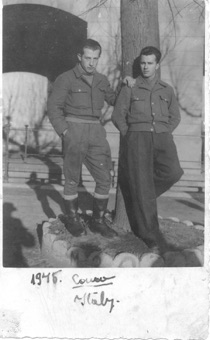
Music from the Carpathian Bow

After several weeks in Como, we were transported to a camp in Cine Cita (Chine Chita), which had been the Italian Hollywood, on the outskirts of Rome. There we took advantage of the unique opportunity to visit all the famous sites of historical significance, which was a special treat. From there, our kibbutz, a group of about forty people, was shipped to Bari, a port city on the Adriatic Sea. There we established residence in a large villa on the outskirts of the city. There I was given the job of food buyer. As we had no refrigeration, I walked into town every day to buy fresh supplies. This gave me the opportunity to interact with the Italians and to learn the language which didn't appear too difficult, and I picked up the basics, enough to get by, in a short time. In the beginning, I communicated by gesticulating, which was a usual practice in Italy as a substitute for speech. I found the Italians to be warm, friendly people, easy to get along with and fun to deal with. I remembered the stories my father used to tell us about Italy, where he served in the Austro-Hungarian army during World War One, about how nice the people were and how there were towns built on mountains, which was unheard of in our country. As the majority in our group came from Hungary, we all, of course, communicated in Hungarian. I was even thinking in that language. One day I was asked to buy yogurt, the Hungarian term of which is "slept milk." That is the literal translation in English. I reasoned that milk in Italian is "latte" and to sleep is "dormire." Equipped with this linguistic knowledge, I walked into a dairy store and asked a young lady for "latte dormire." Evidently my pronunciation wasn't exactly impeccable, and it must have sounded like "notte (night)" or "let to (bed) dormire," which gave her the impression that it was a lurid suggestion, whereupon, in an outburst of violent rage, she picked up a broom and chased me out of the store. Of course, I beat a hasty retreat amidst the strident sound of a severe tongue-Iashing. I was glad there was no one else in the store. Following this not too pleasant adventure, the lesson learned, I went to another store and, instead of speaking, merely pointed to the yogurt.

In May 1946, Lilly and I got married. Our wedding was attended by the Mayor of Bari who was an Italian Jew but quite assimilated. Meanwhile in the summer of 1946 my U.S. relatives, having learned from the U.N.R.R.A. of my whereabouts, sent me a letter informing me that Morris was living in New York, and Mordechai survived the war and lived in Palestine. The labor battalion in which he served had been liberated by the Yugoslav partisans and he subsequently emigrated to Palestine in 1944. My relatives asked that we come to America. That represented a dilemma as ideologically Palestine held the greater attraction. I felt that after two millennia of persecution, humiliation and slaughter the only place for us was our ancient homeland. Besides I had a brother there. But I had a brother in the U.S. too and after what we lived through, family was a precious commodity. What added to the inner conflict was that America also held the promise of individual freedom and freedom from persecution. It was a difficult decision to make. What finally tipped the scale in favor of settling in the U.S. was Sarah and Joe. Sarah, having been an intimate part of my childhood experience, represented close family: Roots. And so we decided to come here. Lea, Lilly's sister, decided to go to Palestine. Mordechai, having been asked to settle in the U.S., declined on the grounds that Palestine was our country and the only place for him. In a way, I envied him. With heavy hearts we said good bye to Lea and our good friends in the kibbutz and moved to a D.P. camp in Santa Maria di Bagni (Banyi), which had been a resort by the ocean of the Ionian Sea. There we were given a room for ourselves, enjoying privacy for the first time since liberation. It was there that I taught Lilly how to swim the scientific way, not the Verecky method. It did not take her long to master the art. There we applied for a visa and were placed on the Czech quota, and our relatives in the U.S. set the wheels in motion acquiring the necessary papers there.
Memoirs
Boris Segelstein